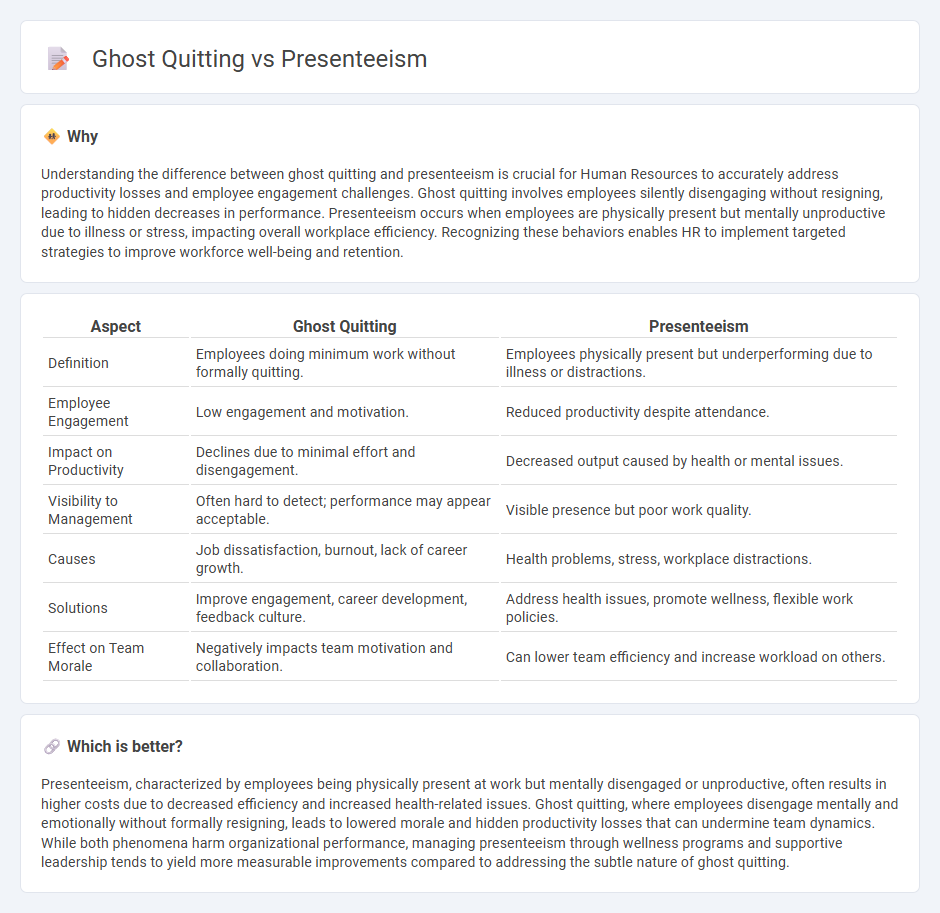
Ghost quitting occurs when employees disengage mentally and emotionally from their work while still physically present, leading to decreased productivity and morale. Presenteeism, on the other hand, involves employees attending work despite illness or other issues, resulting in subpar performance and potential health risks. Explore the key differences and impacts of ghost quitting versus presenteeism to improve workplace efficiency.
Why it is important
Understanding the difference between ghost quitting and presenteeism is crucial for Human Resources to accurately address productivity losses and employee engagement challenges. Ghost quitting involves employees silently disengaging without resigning, leading to hidden decreases in performance. Presenteeism occurs when employees are physically present but mentally unproductive due to illness or stress, impacting overall workplace efficiency. Recognizing these behaviors enables HR to implement targeted strategies to improve workforce well-being and retention.
Comparison Table
| Aspect | Ghost Quitting | Presenteeism |
|---|---|---|
| Definition | Employees doing minimum work without formally quitting. | Employees physically present but underperforming due to illness or distractions. |
| Employee Engagement | Low engagement and motivation. | Reduced productivity despite attendance. |
| Impact on Productivity | Declines due to minimal effort and disengagement. | Decreased output caused by health or mental issues. |
| Visibility to Management | Often hard to detect; performance may appear acceptable. | Visible presence but poor work quality. |
| Causes | Job dissatisfaction, burnout, lack of career growth. | Health problems, stress, workplace distractions. |
| Solutions | Improve engagement, career development, feedback culture. | Address health issues, promote wellness, flexible work policies. |
| Effect on Team Morale | Negatively impacts team motivation and collaboration. | Can lower team efficiency and increase workload on others. |
Which is better?
Presenteeism, characterized by employees being physically present at work but mentally disengaged or unproductive, often results in higher costs due to decreased efficiency and increased health-related issues. Ghost quitting, where employees disengage mentally and emotionally without formally resigning, leads to lowered morale and hidden productivity losses that can undermine team dynamics. While both phenomena harm organizational performance, managing presenteeism through wellness programs and supportive leadership tends to yield more measurable improvements compared to addressing the subtle nature of ghost quitting.
Connection
Ghost quitting and presenteeism both reflect underlying employee disengagement that negatively impacts organizational productivity and morale. Ghost quitting occurs when employees silently reduce effort or mentally withdraw without formally resigning, while presenteeism involves attending work despite illness or personal issues, leading to decreased performance. Both phenomena signal the need for improved workplace engagement strategies and supportive management to enhance employee well-being and retention.
Key Terms
Employee Engagement
Presenteeism, characterized by employees physically attending work but mentally disengaged, significantly reduces productivity and increases burnout risks, while ghost quitting involves employees withdrawing effort without formal resignation, causing hidden declines in team performance and morale. Both behaviors negatively impact employee engagement and organizational culture, emphasizing the need for organizations to implement proactive engagement strategies and supportive leadership to identify and address underlying issues. Explore effective approaches to enhance employee engagement and mitigate the effects of presenteeism and ghost quitting for a thriving workplace.
Productivity Loss
Presenteeism, characterized by employees being physically present but mentally disengaged, significantly reduces workplace productivity by impairing focus and output quality. Ghost quitting involves employees discreetly disengaging and performing only minimal tasks, leading to unnoticed but substantial declines in organizational efficiency. Explore in-depth strategies to identify and address these subtle yet impactful productivity losses.
Discretionary Effort
Presenteeism occurs when employees are physically present but mentally disengaged, leading to reduced discretionary effort, whereas ghost quitting involves employees performing just enough work to avoid detection without genuine commitment. Both phenomena significantly impact productivity, employee morale, and organizational growth by depleting discretionary effort, the extra energy and motivation employees voluntarily contribute beyond their basic job requirements. Explore how managing these behaviors can enhance workforce engagement and optimize company performance.
Source and External Links
Presenteeism - Wikipedia - Presenteeism is the act or culture of employees attending work while sick or unwell, leading to reduced productivity, often driven by factors such as financial need, job devotion, or managerial expectations.
Is presenteeism a problem? You may be encouraging it - BetterUp - Presenteeism describes employees who show up to work despite illness or exhaustion, prioritizing presence over health, which can increase errors, spread illness, and cause psychological harm.
What is presenteeism? - Future Forum - Presenteeism is the pressure to meet visible behavioral expectations rather than actual productivity, often causing wasted effort, burnout, and exacerbation of health issues.
 dowidth.com
dowidth.com